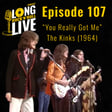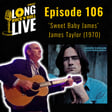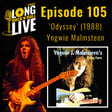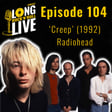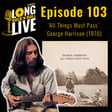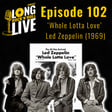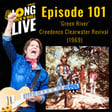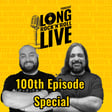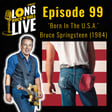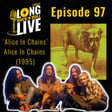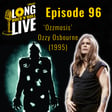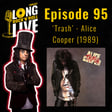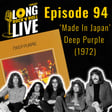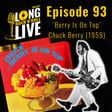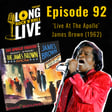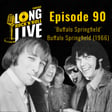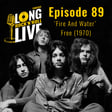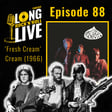Introduction and Illness
00:00:15
Speaker
Hello there, and welcome to another episode of the Long Live Rock and Roll Podcast with your hosts, myself, Mr. Lasmike Leedies, and on the screen opposite me, your co-host, Mr. Felipe Amorym. How you doing, bro? Hello, brother. How are you doing, man? Yeah, good. Guys, listen, I'm a little ill today. You can probably hear it in my voice. I'm a bit sniffly, I'm a bit sneezy. I'm going to do my best to try and not sniff and cough and sneeze through. I'm going to turn away so you might hear faint sneezes in the background.
00:00:42
Speaker
But I'll do my best and we'll try and keep this normal. But yeah, just bear with me, basically. But Felipe, you've got a story to tell. You've got a story to
Felipe's Band Story and Supertramp Connection
00:00:51
Speaker
tell, apparently. Felipe's a little late. He's about 20 minutes late to our recorded time. You said, I've got a story that you're not going to believe. So I'm going to take this. So go for it. Very good reason. Very good reason. My first ever band was with my cousins back in Brazil. So I had a band with them.
00:01:12
Speaker
I have to mention his name, Gustavo Dori, my cousin. He was a bass player and singer in this band. And we used to do pretty much what we do with this show, like just sit and listen to albums and talk about stuff.
00:01:30
Speaker
And one of our favorite albums was the Supertramp live in Paris. So he used to talk about that. And he called me this morning. He lives in Japan. So we haven't spoken in ages. And he called me this morning and said, man, I was listening to some music. Some of the stuff we used to listen to. And I decided to give you a call.
00:01:51
Speaker
Oh fantastic. So it's totally related to the show. Brilliant. And I said if you won't believe me, I woke up this morning listening to Supertramp and I was thinking of you as well. So that's a perfectly valid reason you delayed the show to go and talk to a former colleague about Supertramp which is absolutely fine because actually we haven't told the audience what we're doing yet. Today we
'Breakfast in America' Album Introduction
00:02:16
Speaker
are doing the album
00:02:17
Speaker
breakfast in america by supertramp so now it makes sense to you why i'm okay with philippe being late talking about supertramp.
00:02:27
Speaker
Exactly. I first got to know them by the live album that came after this, which is really cool. Yes. Do you know what? Let's talk about that, because that's exactly how I got to know them as well. I used to go and hang out with my stepbrother, Tarik, in London. And one of the first times we hung out together, I arrived at his house and super trammed live in Paris, was on Sky Arts. And
00:02:54
Speaker
I'd never heard any of their music before, and this is years ago, by the way, I really couldn't even, maybe 10 years ago, maybe a little, maybe eight or nine years ago, but anyway, I remember listening and just hearing this
Supertramp's Musical Style: Prog Meets Pop
00:03:11
Speaker
fantastic variety of like different kinds of music from this one band. And like instruments, these guitars, harmonica, saxophones, keyboards, basses. I'm just like, my God, it's a rock band that seemed to play everything, but the music that was coming through was just, it was just different. It was like, it was poppy, but also proggy. It was heavy, but also accessible. It was like, I just had a bit of everything. Well, it's interesting because when I listened to them this week,
00:03:40
Speaker
I was like, this is more prog than I remembered. I haven't listened to Super Tramp in years, apart from the occasion of radio play. Sometimes you're somewhere and they play on the radio. But I'm really impressed because I thought, well, we're going to actually be talking about an album that is more like a pop album by a prog band than
00:04:04
Speaker
than the other way around. But it sounds a lot more prog than I remember. And as far as I'm concerned, they were even more prog before this album and they went back to it later in their career. So this might be the closest they ever been to pop music with this album.
Album Preferences: 'Crime of the Century' vs 'Breakfast in America'
00:04:25
Speaker
that's something I was going to sort of bring up at some point is that my favorite, so I don't know much Supertramp, I know this album, I know the album before and I know the album before that and the album, the one I'm talking about two albums before is called Crime of the Century and I love that album, I've got it on vinyl, it is one of my sort of
00:04:45
Speaker
favorites or 70s rock albums. I think there's just so many great tunes on there. And I do prefer it to Breakfast in America, but there's an accessibility in Breakfast in America, isn't there, where just anyone can listen to it and connect with any of the songs as it is in any of those songs on Breakfast in America could be on the radio. Yes, any of them, any of them, you know, still they they experimenting as well, which is which is not
00:05:13
Speaker
what you would think of a really hugely popular album like this. But yeah, because I think that the fact that they have saxophone and harmonica and the whole orchestration is different. The way they arrange stuff, it's not that can also
Instrumental Analysis: Guitars, Pianos, and More
00:05:36
Speaker
band leader, let's put it like that, is a piano player. So you have more piano and keyboards as the lead instrument than anything else. So the guitar is a bit in the background, isn't it? It's really funny you say that because one of my
00:05:51
Speaker
one of my sort of takeaways from this album and the instrumentation of it. I've got it written somewhere on one of the songs on my notes, but I loved how the guitar, so things like, I don't know, let's take the saxophone and the harmonica, they're instruments.
00:06:08
Speaker
That when they used in this album, they're never leading the song. There's never a song that's led by the saxophone. They come in and it sometimes maybe it plays a few little motifs and melodies at the end of a section. The harmonica comes and does a little solo.
00:06:25
Speaker
for a rock band to have a guitar that never leads a song that the guitar is only there like the saxophone and like the harmonica just to come in and embellish stuff add a little melody here do a solo here i just found it funny that the guitar i don't want to say never but i think i think very rarely leads the song leads any of the songs
00:06:48
Speaker
It doesn't. I don't think it leads the songs. It adds a lot, but doesn't lead. That's what I think is interesting because probably that's what allowed them to go through lineup changes and keep their identity because it's still about those two voices and that piano more than anything else. That was probably a clever thing to do, to just stay in charge. The band leaders are in charge of
00:07:15
Speaker
the most important layers of sound in the band. Yes, and be it their vocals, be it the guitar, be it the keyboards, you know, because they're both very influenced in that. Look what I picked out, because I'm going to watch it later. Oh, that's it. I've got it on Blu-ray. Yeah, I'm going to watch it later. Cool. Right, I'll do the normal little information about the album. So the album's called Breakfast in America. The artist obviously is Super Tramp. It was
Prog or Pop? Debating 'Breakfast in America'
00:07:42
Speaker
released on the 29th of March 1979.
00:07:45
Speaker
and it was recorded between May and December 1978, produced by Peter Henderson and Supertramp. The length is about 46 minutes and typical genre is associated with it. Pop, art rock and soft rock. Now my first question is why do people not, I did quite a bit of
00:08:04
Speaker
sort of looking around and sort of researching. I heard pop, I heard art rock, I heard pop rock, I heard soft rock. Didn't see much mention of Prog, which I thought is quite interesting because although it is a far lesser Proggy album than the previous stuff, it still definitely has Prog elements, don't you think?
00:08:22
Speaker
Well, yeah, the last song, the second half of the song is them jamming. Yeah. Very proggy way. So and even if even if you listen to to the very first track in the album, it's quite like dramatic in a in a in a kind of classical music approach. And I like that. And it's and you have this piano riff leading the song. I think it's that's
00:08:50
Speaker
Extremely Prague. Yeah. Yeah. So because because attention to maybe, um,
00:08:59
Speaker
We tend to analyze songs based on the melody and lyrics, and then if you strip it down to those two things, then yes, they were essentially, well, this album is essentially a pop album in that sense. But the
Vocal Dynamics: Davies vs Hodgson
00:09:15
Speaker
instrumentation for me is all Prague, and I'm a big fan of Prague, so that for me is a compliment. It's funny because you said how keyboard heavy it was, and it does,
00:09:29
Speaker
or piano and keyboards. And it is very much like that. The impression and the feeling that comes to me from that is that it has a very musical theater-esque sound on it. And I think another thing that lends itself to that sort of characteristic is the vocals, because throughout nearly the whole album. So we'll talk about the band quickly. So you've got Rick Davies, who is the band leader, right?
00:09:58
Speaker
on vocals and keyboards. You've got Roger Hodgson who's like the co-band leader on vocals and guitars with the occasional keyboards. Then you've got John Helliwell on saxophone, woodwind and backing vocals, Bob Seidenberg on vocals and drums and Dougie Thompson on bass. So as you mentioned you've got Rick Davies and Roger Hodgson leading the band with their vocals.
00:10:22
Speaker
and throughout most of the album, you've got both of them. One of them might sing a song or sing the full song and this, sorry, one of them might take the lead vocals on this song and the other one take the lead vocals on the next song. But in a lot of the music, there was back and forth, isn't it? Roger sings and then Rick replies to it and vice versa. And that's what made me feel like it was always musical theatre and as well with the piano leading it, I could just envision in my head.
00:10:50
Speaker
Well, we'll talk about the lyrics later, but I can envision characters traveling to America and the stage show on the stage, them talking to each other. You know, it's got that sort of feeling, hasn't it? Yeah, it does. Goodbye, strangers, I think is the
00:11:06
Speaker
the biggest moment of that kind of interaction. And one thing I like is that their voices are so different from each other. Like, yes, you have this high pitch voice, you know, proper, like, lyric, like, like, it's a falsetto. And
00:11:24
Speaker
Yeah, exactly. And the deeper voice of Davis, which is, it's, it's just like completely different. You know who is singing when they sing. It's just like Roger Waters and David Gilmour and Pink Floyd when they sing, you know who is who. And the contrast is really cool. Sometimes like, how do you decide who is the best? And also, who's your favorite singer in the band when they have different vocals? In my, my opinion, I'm a big fan of the contrast. It's not about
00:11:52
Speaker
who sings better or who has the most beautiful voice. Yeah, I love the fact that you can use both voices in that way. And as I said, and they use it in a pretty much like a conversation instead of harmonizing, which I believe is one of their unique selling points. Let's put it like that. Yeah, no, this is really good stuff. Talking of the first song then, I mean,
00:12:19
Speaker
What I loved, and we mentioned the guitars, is that in the same way that I said the guitar just comes
00:12:25
Speaker
as an extra, you know, it's not part of the song until they add it in just to add some textures to the end. They've got that really hard rock riff at the end of Gone Hollywood, isn't it? Which really reminded me of some of the music from Aqualung by Jethro Tull that we received. Because with Aqualung, although it was much more guitar-heavy and guitar-led, there were moments where it actually wasn't so much and the guitar
Lyrical Themes: American Dream and Reality
00:12:50
Speaker
would just creep in at the end.
00:12:51
Speaker
And although you got an overall progressive sound from Aqua Lung, there were still moments that felt like hard rock verging into heavy metal in terms of hard distorted guitar riffs.
00:13:02
Speaker
Yeah, yeah, exactly. But that's, again, the freedom to experiment and try those things and not having to make one song sound like the previous song in the album. And I think there's a lot of this in this album. They have the main characteristics of the piano and the vocal contrast. I wouldn't even say the vocal harmonies, but the contrast. And those elements are in the whole album, but the songs
00:13:33
Speaker
you know, they do vary a lot from, you know, from long, slow songs with longer instrumental sections to like shorter songs with mainly piano vocals. So you got it all. Gone Hollywood is, I didn't remember that song when I listened to it again, I was like, wow, this is so cool.
00:13:55
Speaker
And obviously, again, I focus way more on listening to the lyrics now. And the lyrics are just brilliant in that song, because this guy disappointed with Hollywood, like, you know, so I've moved to California and it's not what I thought it was. And I think the whole album has this vibe about like, the album cover, I mean, if you can't describe it, it's
00:14:17
Speaker
It's just brilliant, isn't it? Yeah, so it's like he's looking out from an aeroplane window and he can see, well, do you know what it is? It's in New York. I think it's New York, but everything's shaped like... Yeah, there's a skyscraper. But it's shaped like cups and, you know... Is it? Yeah, that's something I didn't look at. Check it out. Oh my God, you're right, of course. Yeah, how do you know it's here?
00:14:43
Speaker
salt and pepper shaker, teacups. Yeah, those are the buildings. Yeah. So that's like New York, but the buildings are brilliant. That's really clever because my own fault for not sitting there and saying, right, let's look at this. I just kind of glanced at it because I'd seen it before.
00:15:03
Speaker
But that is very clever. It's like a trick of the eye. And then you've got this American waitress in front, holding up a tray with us. It's just flying, right? It's just right in front of the window. The plane hasn't landed yet. And it's just like serving. You're just arriving in America, still in the airplane. And then the waitress is like serving you a normal juice or whatever. And the menu is like you need to start spending, right?
00:15:28
Speaker
That's a good point but at the same time you know you're making that point about the sort of the spending side of it and the money in America but I think that also talks to
00:15:39
Speaker
probably the personalities of Americans, because obviously, you know, Americans, they're so diverse, you get some that are just like any, any sort of nationality of people, you get lovely ones, you get not nice ones, people in the middle, whatever. But one thing that Americans are is, you know, stereotypically, what did you say? In general, in general, yeah, quite.
00:16:00
Speaker
What do you say? Energetic, forthcoming, that they want to talk? Well, if you compare the average American to the average British, they're definitely more cheerful. Exactly, so you can imagine. In Britain, for foreign listeners, for listeners who aren't British, if you walk into a restaurant,
00:16:19
Speaker
You might have to stand for a minute or two at the front where a sign says, please wait to be seated. And the waitress and the waiters, they go around in their sauce. Okay, well, let me serve this guy's food first. Right. Have they got their drinks? Right. Okay. Now I can see this couple. Hi guys. Where are you? You know, you here for dinner today?
00:16:37
Speaker
Whereas Americans, I feel like as soon as you're in the door, it's like, well, how can I get a seat for you to have this energy, don't they? Such lovely people, Americans, you know, but then but then there's the thing about the what you think America is as a tourist or someone who's watching a movie.
Symbolism in Album Artwork
00:16:58
Speaker
someone who is living there. I don't know if they were living there, but they were there for the recordings, they were there for months recording the album in LA. And the lyrics are of this first song Gone Hollywood about someone who is there and they didn't make it.
00:17:13
Speaker
as an artist or an actor, aren't they tired of people slamming the door? There's that reference in the song saying, you're not what we're looking for. And there's disappointment. So like, oh, I'm in LA, loads of creepy people around. So that's the dark side of it, isn't it? It's like I've got here two notes about the lyrics of that song. Number one, American Dream Gone Wrong. And number two, just a lyric I found really funny.
00:17:43
Speaker
So many creeps in Hollywood. I mean, some motel near the Taco Bell. Exactly. So that's not the dream, right? Let's know what you see on TV. Yeah. But it's so that I think it's it's quite a statement to open an album with a song like that. There's like musically challenging, not so not half as pop as most of the album, in my opinion.
00:18:10
Speaker
And it's kind of, it's not the kind of pleasant lyrics you would associate with a popular song as well. So it's like, yeah, it's quite dark. Well, yeah, no, I was going to say that I've actually, there's two other songs that I felt this about and just agreeing with you.
00:18:33
Speaker
The music comes across as more pleasant than the lyrics, isn't it? The music you're hearing, if you were to just have, if the vocals weren't saying words, but it was just the notes he sings, you'd think, oh, this is a nice song. It sounds nice. It's pleasant in my ears. The chords are nice. There's loads of major chords, not very many minor chords. It's pleasant to hear. Yet the lyrics actually tell a darker story, as you said.
00:18:57
Speaker
Yeah, yeah. And there's some reflections and some interesting points and lyrics about the two band leaders' relationship as well, because they, well, Hardsong left the band in 1983, if I'm not wrong. Not really, you know, many, many years after this album. So they already had their clashes and their
00:19:26
Speaker
differences at this time. And so it's quite, and that is reflected on the lyrics, and it's, it's quite dark in that sense. And but as I said, the melodies are so beautiful, the vocals and everything. And just to make it fair to them at the end of this song, it does get more cheerful. And it's like, oh, you haven't tried hard enough, you know, just keep going. And things are going to be fine. But it's still not a very positive way.
00:19:56
Speaker
to start an album in terms of lyrics. But you know, it's like, that's rock and roll, right? You do whatever. I'm talking about rock and roll. How about the next song, if you don't mind me moving on to the next one?
00:20:10
Speaker
Yes, yeah, the logicals, yeah. It's very, it's very, again, it's got that very musical theatre thing, isn't it? It's like, you know, when I was young, the logical, and it's just very, very, I've heard Staccato either the whole way through that intro. Very cool. What do you like about it? Well, let me ask you one thing. Did you get to know the song when you were quite young, or
00:20:36
Speaker
Were you young enough? No, I wouldn't say so. Like I said, the first time I heard Supertramp was about eight years ago in that DVD, got into Crime of the Century a couple of years ago, and now Brixton America. Yeah, so I was quite young. And obviously, I didn't speak English, but not only that, I don't think I would have paid attention to lyrics. And I think when you were young, you could enjoy the melody and
00:20:59
Speaker
even sing along. But as I said, it's like theatrical and it's happy and it's a tempo. It's got all the elements of a great radio hit, but the lyrics.
00:21:16
Speaker
the lyrics are like, Oh, my God, what I listened to it as like, it just, it makes me feel bad sometimes, like, just like, basically, they reflecting on like, yeah, when you're young, everything's alright. And you can you see the world under different perspective, isn't it? You see the beauty of nature, you see like, you know, your friends and having a
Societal Critique in 'Logical Song'
00:21:40
Speaker
good time. And then I love this line. But then they sent me away to teach me how to be sensible.
00:21:46
Speaker
Logical, responsible, practical.
00:21:50
Speaker
Wow. Wow. Isn't it what people do with us in life? Like, OK, yeah, yeah, you know, you're like naive, you know, you're happy, you enjoy life is not how it is. Let me send you to a place. It can be school. We can do whatever. So, yeah, a job. And then you need to be sensible. You need to be logical. And just skipping to the very end of the song. I love what they there's. I think it's a very last line. I was feeling so logical, digital.
00:22:21
Speaker
So it's becoming robotic. So there's a reference to technology there. Doesn't it relate to modern life? You're becoming more digital. I agree. Yeah. Do you know what? I'm going to come back to that point because I just want to go back to what you said about one of the first lyrics. It says, what was the first lyrics you mentioned? They sent me a way to teach me how to be sensible, logical, responsible, practical. So the next verse,
00:22:46
Speaker
it gets a little political doesn't it isn't there something where it says oh i love it yeah i have it here i had that so uh i said watch what you say or they will be calling you a radical liberal fanatical criminal yeah really isn't it that's almost like that's almost like when when i read those lyrics i kind of thought this is the
00:23:11
Speaker
I don't know what word to use. Modern, well, I say modern, but yeah, this was bloody 1979. At the end of the 1970s, him trying to say, even then, people are telling me to keep my views calm. Yes. Are you going to be labeled a liberal and a radical? Yes, yes. And think about, yeah, liberal or radical. So whatever you do, there is not
00:23:40
Speaker
Whenever you disagree with whatever's your official agenda, then you're going to be labeled as something. Or, you know, pretty much everything you say is going to put you into a certain, you know, it's a certain label, isn't it? It's like nowadays, I know, I don't...
00:24:01
Speaker
nowadays anything any opinion you have someone will be offended and i'm not i'm not i'm not i'm not trying to be oh you know i hate wokeness and i'm not trying to sort of comment on that i think that now there are so many opinions out there and especially with things like twitter and modern media highlighting minute details
00:24:19
Speaker
Any opinion you have, nowadays someone will seem to be offended by it. Oh yeah, exactly. Because there's obviously people who are intentionally offending people and just not being nice. And there's people who just want to state a certain opinion without even
00:24:34
Speaker
being aware that that's offensive for some people. The interesting thing about this is these traits of society were clearly already happening years and years ago, where people would be just waiting for an opportunity to label you point of finger, you cancel you, let's put it like that. And it's what he's saying in the lyrics, and if you don't sign up
00:24:59
Speaker
to what they wanted to sign up and then you're just not part of society.
Rock and Roll Critique of Society
00:25:05
Speaker
That's very clear in the lyrics and it still happens. I think nowadays it just became bigger because of the
00:25:15
Speaker
the amount of information we've got available and the speed of information, that is the main issue I'll say. And the platform that in quotation marks regular people have to voice their opinions like Twitter, like social media, you know, all that sort of stuff. Yeah, can I just like mention another part of the lyrics here? I love it. Just after that one, when
00:25:37
Speaker
when he's saying they're going to call you a criminal. And he says, once you sign up your name, we'd like you to feel that you are acceptable, respectable, presentable, and verstable. Wow. So join us in being a normal person because you think like us, because we want you to be part of our group where everyone thinks the same thing, isn't it? It's amazing. Well, I think it's time for a segment.
00:26:07
Speaker
Oh, okay. Go for it. Yeah. So how rock and roll is this? It's a massive radio hit with a catchy chorus.
00:26:26
Speaker
and all the elements of a perfect pop song with lyrics criticizing the normal way people live their lives. Criticizing what is popular and what is acceptable and making you reflect on those things. It's a way of using
00:26:49
Speaker
accessible music to criticize what is acceptable in society. A lot of bands, obviously, have done political lyrics and lyrics against the establishment and all that sort of stuff. But what I think makes this so rock and roll is that, like you said, it was such a radio-friendly song. It was probably one of their biggest hits. It was played. Everyone knew it. So I'm going to give it the rating for the same year it was released. It's a 79 out of 100 for that one.
00:27:19
Speaker
Anyone can relate to that because regardless of what kind of opinion you have and regardless of the subject, everyone has been labeled as the weirder at some point in their lives. Just because you didn't agree with a certain thing or you didn't belong to a certain group.
00:27:37
Speaker
And it's shocking the way he reveals this reality. It's almost like I feel like when I'm listening to it, I feel like I'm 70 years old and someone is just telling me, listen, the world is not what you think it is. And if you don't sign up,
00:27:54
Speaker
you know, to the official stories or to what the people in this place wanted to sign up to, then you're not part of the community, not part of society. And you're an interesting thing to add to that. You've got to remember that having, in America, passed three years after the Vietnam War ended, that they were recorded. So you have to imagine that America was quite divided at this point.
00:28:18
Speaker
I know a lot of racial tension and segregation was going on in the 70s, wasn't it? So as well as that, the Vietnam War that divided people completely, you know, I think I generally were probably more than two sides, but the two biggest sides were, well, we got to defend freedom throughout
Cultural Tensions Post-Vietnam
00:28:35
Speaker
the world. So we should be there fighting. And the other people were saying, well, actually, this isn't our war. You know, we shouldn't be sending our own troops to be killed in a war that we really have nothing to do with.
00:28:45
Speaker
So that had to be a huge divide and I wonder if Supertramp going over to America to record this album, I wonder if they felt the sort of tension. Yeah but the fallout of the tension, because the war had ended by this point, I think it ended in 1975 so you got three years of the country kind of trying to rebuild itself after that war and like you said I wonder if they were sort of witnessing the fallout of the tension of that war but
00:29:11
Speaker
Yeah, also, as British musicians in America, they have a different view of that, isn't it? Like, you're a foreigner. And it's like, well, maybe you can see the different sides clashing and thinking,
00:29:27
Speaker
If I'm around those people and I don't agree with that, so I'm a weirdo. But if I'm in the other group as well and I don't agree with that, I'm also the weirdo. So that's why I think this song is so cool because it's not belonging. And I think there's even more philosophical side of it.
00:29:48
Speaker
pretty much asking someone to help him to recognize himself. Like, who am I? I need you to tell me who I am, because I don't know who I am anymore. I said to you, I wanted to come back to your comment about the digital lyrics in this song. So to move on from there, I'm going to go all the way to the last song of the album, because I found the lyrics really interesting here.
00:30:13
Speaker
The last song is Child of Vision. And here are some lyrics. There's three different sets of lyrics that I really enjoyed. Number one, you say you're having fun, but you're busy going nowhere, just lying in the sun. Number two, and you're poisoning your body, and you're poisoning your mind, and you gave me Coca-Cola because you said it tasted good, and you watch the television because it tells you that you should. And the final lyric, there must be more than this life. And when you were talking about digital earlier, I was kind of wondering if this was a little
00:30:42
Speaker
Not a dig, but an observation of generations to come, you know, child of vision. Are they becoming obsessed with unimportant stuff, Coca-Cola and television? What do you make of those things? Yeah, I think there's a lot about that, especially, again, think about this. So British guys going to America for a while. All those things that you see here and you see everywhere in the world,
00:31:05
Speaker
It's probably just bigger in America because everything is bigger and louder. You need to drink Coca-Cola, watch TV, do this, do that. As Roger Waters said, you're going to amuse yourself to death, isn't it? It's what it is. You keep yourself busy with video games and TV.
00:31:29
Speaker
and junk food and all that stuff. And they probably saw a lot of that, especially in LA also. And yeah, it makes it like, will I ever find time to think of the important stuff? So yeah, so the digital era wasn't, well, it was going on, right?
00:31:49
Speaker
not at the same level, but it was already going on and they could see that. And isn't this one of the most amazing things of rock and roll artists is the ability to see beyond and to talk about topics that people don't want to talk about? Yeah, it's like addressing issues, not necessarily issues, but addressing topics and discussion points that actually if some people are
00:32:15
Speaker
not afraid, but it's kind of like, you know, I suppose in that time where television was becoming more popular, who would sit there and say, oh, this is a bad thing? I'm not saying Supertramp is saying it's bad, but they're obviously observing the impact that it's having on people's lives. And like you said, maybe in America, it was bigger, the obsession with television, the Coca Cola boom and all that stuff. I wonder if they saw that on a much grander scale than in Britain and went, well, hold on, let's
00:32:41
Speaker
is there something going on here again i think technology is fantastic and we're so family look at us now this is the only reason we're able to do this is because of technology that they didn't have back in the eighties and seventies so is a fantastic achievement for humankind to be where we are now but you know you see i mean you live in london how many people maybe including yourself
00:33:01
Speaker
on train journeys everyone's on their phones scrolling scrolling scrolling you know that makes people happy fine but i love that supertramp have kind of addressed it here becoming obsessed with tv and coca-cola and look where we are 40 years later exactly we were on the phone all the time and it's like now but i think that that's that's interesting thing there's there's like sides to everything and there's a positive and a negative impact of of every um
00:33:31
Speaker
every modern technology and every achievement that humankind has, because it's like, things get better, but they get worse in different aspects. And I think the beauty of their approach, Supertramp's approach to this is like, we're not giving you a
Open-ended Lyrics and Listener Interpretation
00:33:52
Speaker
100% solid point of view and saying, because otherwise, it would be doing the same thing they criticize, oh, this is what it is. And that's what you should think or you should agree with us. It's just an observation, isn't it? Is an observation more than
00:34:07
Speaker
simple like criticism or listen to me follow my point of view. That's one thing I love about it. It's like, well, we're observing things and we find these things a bit. I don't know. We think we should be talking about this. It doesn't mean they have a solid
00:34:25
Speaker
uh point in a certain way like oh you need to listen to me this is what's going on and if you if you can't see it is you're wrong that that's that's maybe why they're so cool because it leaves it open to the listener to to to just think with them not to agree with them but you think and i love it really cool uh that well i really and also uh what a way to start an album that ends with uh deep lyrics and and um
00:34:55
Speaker
interesting creative arrangements and you go from Gone Hollywood to logical song to Goodbye Stranger. I think it's one of the best sequences of tracks to open an album I ever heard in my life. I think they do it in Paris. So they don't do Gone Hollywood but they do logical into Goodbye Stranger.
00:35:19
Speaker
It doesn't make sense to gather those two songs. Yeah, yeah. Yeah, they are three really good opening songs and Goodbye Strangers, one I quite like as well. They actually, the first time I heard it was in the American version of The Office. You know it, you've seen bits of it. Yeah, I've seen it. And they do, they hate this guy called Toby. And so when he leaves, Michael Scott, the main character played by Steve Carell, he's so happy, he hates this guy. He's happy that Toby's leaving. He goes,
00:35:48
Speaker
Goodbye Toby, like he does a little a little parody of it and it is pretty funny. So that's the first time I heard the lyrics in that sense. Sorry, the melody heard this song in place. We mentioned earlier, didn't we? Conversational vocals, the back and forth between them, very keyboard heavy. I love the guitar effects at the end because it comes in with like this really
00:36:15
Speaker
I don't even know how to describe it, this weird guitar effects that come in before it starts soloing. And this is actually the point where I wrote, I love how the guitar isn't the main instrument in the song, it's there to embellish, not to lead. And you're right, it's a trio of fantastic songs to kick off an album. It is, it's just perfect. And the lyrics, I like the, again, going back to
00:36:38
Speaker
analyzing things, observing things, but not necessarily having to take a side because that's a really interesting thing. I love this part of the lyrics. I says, Goodbye, stranger. It's been nice. Hope you find your paradise. Try to see your point of view. Hope your dreams will all come true. I don't know if it's ironic or not, but the whole thing is like, listen, I couldn't really subscribe to your point of view, but I hope you find your happiness. That's so beautiful. That's a really
00:37:08
Speaker
Yeah, that's a really clever way of interpreting it because I didn't go that deep. I kind of just thought it was about multiple short relationships with women that he just couldn't find the appropriate, I don't know, connection he was looking for with these women. Well, what do you make of them? Because I've only got two points. I either thought it was about, like I said, multiple short relationships with women called Neri and Jane.
00:37:35
Speaker
or I thought he'd gone Paul McCartney and wrote a hidden song about weed because obviously weed is known as marijuana and Mary Jane is like a, what's the word, not euphemism, a slang for weed, you know, Mary Jane, marijuana. So I did think it was about that, but the lyrics almost seemed a bit too deep for it to be about weed. So what do you think of them? I think it's about relationships in general, like friendship and yeah, I think it could be anything.
00:38:04
Speaker
And I think it's interesting that, well, there's a verse, I want to mention this verse, which I really like. Now I believe in what you say.
00:38:15
Speaker
It's the undisputed truth, but I have to have things my own way to keep me in my youth. So he's saying to someone, what you're saying is the absolute truth. But I don't want to do it. I don't want to subscribe to it. I don't want to subscribe to it. Isn't that what we were saying about
00:38:35
Speaker
Which song are we talking about? A child's fiction and logical. Some tiny words that sort of link together themes of a much larger scale. Yeah he can be ironic. I think I've found this interview with Davis and he mentioned something about this song. It could say it can be about the boy-girl thing or it can just be about two friends or about you know any sort of relationship and it's
00:39:04
Speaker
And when you think about it, it's just, yeah, how hard it is to accept that someone thinks differently than you. And that doesn't mean they write your wrong or the other way around. And it's, and it's just, you say, Okay, I believe, you know, I understand that your point of view is the ultimate truth for you. But it doesn't work for me. And I would like to think they're not being ironic about this, or sarcastic or
00:39:33
Speaker
Just like, you know, it's an important way. Yeah, it's like, be happy and I'll be happy my own way. Yeah, love it. Yeah. Going to the next song, I'm really interested to hear what you think the lyrics are about in this, because I tried to sort of make sense of them in context with the America thing with maybe some relation, you know, further down the album, we get into his relationship with his wife a bit more.
00:39:54
Speaker
but I couldn't really decipher Breakfast in America and I tried to google it as well and I didn't really see much analysis of it. Well what do you think this
Title Track's Playful Lyrics
00:40:01
Speaker
is about? Well I did have to look for an interview and Parson mentions... Oh you're showing me up Felipe, all I did was google, you had to find interviews. Look who's the pro now. Yeah I'm the pro. What did he say about it?
00:40:16
Speaker
Well, he's actually saying, well, he said, when I wrote Breakfast in America, I mean, obviously, I had a lot of dreams. One of them was to go to America. And the America that we saw on television was very different to the America that we very much more connected to today. I mean, it was a very archetypal, I would say.
00:40:35
Speaker
Yeah, yeah, yeah. Yeah. In a way, everyone in Texas is a millionaire, for example. So a lot of my thoughts, you know, want to see the girls in California, it was just a playful song. Think, think dreaming of going to America. I think the Beatles had just gone to America, maybe that affected it. But again, I was dreaming and having fun one day, and this song just flowed out.
00:40:59
Speaker
I think the lyric was written in about an hour, so I didn't even stop to think what I was writing, it just came out of me. So I think, yeah, so it is about the American dream and the fact that it's not really, just like the first song, just like Gone Holy, it's not like the dream, but they actually mentioned that they've
00:41:22
Speaker
with those words, the America that we're very much more connected to today. So they accepted the truth. So this is the real America, and that's where we live, and that's what we're doing. And that school is not a dream. It doesn't have to be a dream. So I think it's positive in that way, but it is about the American dream.
00:41:40
Speaker
That's what it is. Musically, I think this song encompasses that art pop genre the most, you know, it says because we spoke about our pop when we did hunky dory by David Bowie and we sort of said that generally it's
00:41:57
Speaker
it's taking the concept of pop and or rock in this case and experimenting with things like classical music and other parts and with Brexton America you've got that keyboard that sounds like the harpsichord you know the baroque style instrument you've got the odd almost middle eastern saxophone that comes in you know the little solo interlude so I thought that was quite interesting and funnily enough it's the shortest song on the album as well isn't it
00:42:22
Speaker
Yeah, maybe it's that. I love the fact that we said it wrote the lyrics in one hour and the song just came out. Sometimes when you don't think or you don't overthink a song, it just sounds better. I mean, maybe it's the best you can do as a songwriter and at least with this song. So it's funny because it sounds to me that the whole album
00:42:47
Speaker
has been thought through, like, you know, we need to do this, we need to do that, arranged, and the lyrics for a logical song are beautiful, like well crafted. And this one, as I said, what's the line he mentioned, everyone in Texas is a millionaire. It's like, yeah, just just throw things like that. Like, you know, like, like if I'm 12 years old, and I'm writing a song about America. And I think that that's beautiful. I think it's a big contrast, as I said, a shorter song,
00:43:15
Speaker
um maybe not so deep lyrics you know but really cool i love it yeah sticking with the american lyrical theme um my favorite song the album is the long way home um do you like it as well it's great isn't it that one um i find the lyrics again very interesting and it's this to me seems um far more uh excuse me um
00:43:37
Speaker
It's telling that story from Gone Hollywood and Breakfast in America, but it's much more specific. I got the impression of, again, American dream gone wrong, but this time maybe for a performer or someone in the show business who's lost their spark or done it for too long. That's my thought. And then I read his interview about it and Hodgson said,
00:44:00
Speaker
I'm talking about not wanting to go home to the wife. Take the long way home to the wife because she treats you like part of the furniture. But there's a deeper level to the song too. I really believe we all want to find our home. Find that place in us where we feel at home. And to me, home is in the heart. And that is really when we are in touch with our heart and we're living our life from our heart.
00:44:21
Speaker
then we do feel like we found our home. So I think my point actually can stand. He's presenting it, in my opinion, as a performer or a show business person in America who's been on the stage too long. They've done it before. They're being moved on, him or her. I think there's a lyric where he says, you lost that spark or something. And I think he's coupling that idea of being
00:44:48
Speaker
drained professionally to the personal aspects of it. When you start getting tired and fed up with your job, whether it's a nine to five job or performing on the West End, if you get fed up of it and you're bored of it, then that translates to home.
00:45:03
Speaker
and he's talking about you know he just he doesn't go going home to his wife it's just another task of the day he's fed up he's going to take the long way so he can he can delay the inevitability of having to maybe argue with his wife or sit down for another meal but you know do you know what i mean so i feel like he's there is a deeper level of meaning to this song what the lyrics suggest but i still think about that american dream gone wrong
00:45:28
Speaker
Yeah, well, and I think there's a lot to do with a musician's lifestyle as well. And it's interesting, he's talking about finding home in your heart, because when you're on the road, you don't have a home. But that feeling of being on the road constantly might feel like home to you. And I think that's what they're talking about. Like, although
00:45:50
Speaker
It's difficult. I don't want to go to home home because then I'll be stuck in the same place with the same thing. So I think there's a conflict between the hard life on the road and the hard reality at home.
00:46:06
Speaker
Yeah. Which means, regardless of where you are, you need to find your own place inside yourself. And I think there's loads of, there's almost like a religious thing. And I want to mention another song is the seventh song in the album, Lord Is It Mine, which it's like a religious song, but it's not simply praising God. It's like, I mean, I want to know if I can talk to you. It's more like,
00:46:34
Speaker
Is it like, am I allowed to do this? Am I part of this? And it's it's kind of questioning and trying to reach out to God in that way and questioning things. And it's quite a deep album, isn't it? Lyrically, it is pretty deep. I think it's an album. I think it's a well crafted progressive rock album about human condition.
00:47:01
Speaker
Yeah. That's how I see it. Prevented in almost pop format.
00:47:05
Speaker
Yeah, exactly. And I think, yeah, it communicates because of that. I read something that that might explain some, some things, but it's I didn't find any quotes from them to back this information. So it's just something I want to mention. Someone said of a few people said that Hodgson was a spiritual kind of religious guy, and Davis was an atheist. So that, and those reflections, the
00:47:35
Speaker
in their music, the conflict between those two views in a positive way, I would say. I don't know if this is true, so I'm just mentioning, because I've found loads of references to these aspects of their beliefs, but I'm not quite sure if it stands.
00:47:54
Speaker
There's not an obvious nod towards religion like there was in Aquilung, was there? In Aquilung, he was very, very obvious about how religious... This is the god, I believe. Exactly. Or is this, you're getting some spiritual implications, but they're so small, isn't it?
00:48:15
Speaker
But what I think is rock and roll in both cases, as you mentioned, I call London, and I mentioned it, Lord, does it mind the song? It's like, again, they're not giving you the truth. They're not giving you like, oh, this is like a solid statement. And that's what I think.
00:48:30
Speaker
uh which i think dave bowie was great at that on the top it's like they're writing songs whilst they still don't understand what they're talking about and this is beautiful it's like i'm trying to figure out who i am what i'm doing what is god for me what is the world what is america for me i don't know i'm just like uh and as i try to figure it out i'm gonna write it down
00:48:53
Speaker
and create a song with it. And I find this just such a beautiful way of writing music. And it's okay, isn't it, to sort of to accept that what you're feeling now might change in the future. So I've got Led Zeppelin tattoos, you know, and someone said, what if
00:49:13
Speaker
you end up not liking Zeppelin in 50 years. I said, first of all, it's never going to happen. But I said, listen, even if that does happen, let's say 50 years from now, I've I've I've forgotten all my heavy metal and rock and roll and I only listen to classical music. The reason I got a Led Zeppelin tattoo is because it is these four gentlemen who got me into playing the bass and I played the bass professionally for 10 years.
00:49:39
Speaker
So it was a huge significant part of my life that was started by this one band. So even 50 years from now, if I don't like Zeppelin, I can still look at that tattoo and it will take me back to a place in life and a moment in life where they meant something to me. They meant something to me so much so that I got a bloody tattoo. And I kind of feel the same with these lyrics and what you're saying about them.
00:50:03
Speaker
Even though Roy Hodgson's views on whatever he's writing might be different today than they are back in 1979, at that moment in time, in his career, in his head, that's how he felt. And I think it's important to get the words on paper just as I've got
00:50:22
Speaker
a tattoo on my arm, do you know what I mean? Yeah, yes, yes. Because that reflects a moment in time. And I think every album is a moment in time. An album is like taking a picture to me as a photograph because it's like, that thing happened that way only once. We have the pleasure to listen to it over and over and over again.
00:50:46
Speaker
because it's being recorded, it's being registered. And those guys I think never played together again after they split. So you had Hodgson doing his
00:51:01
Speaker
solo career and have Davis in charge of a new version of Supertramp and they never actually got together again but that moment in time is there as an album as many albums actually and the song casual conversations is about their relationship as musicians and about the fact that they could at that time see that it wouldn't last even though it took a few more years to actually break up but they knew so
00:51:28
Speaker
Yeah, I've got the notes passion and love fading from the relationship and whether this is a relationship between him and his wife which I thought it was initially because of the song Long Way Home but you could be right man, it could be about the relationship between the band. Did you read into it? Do you know that it's about the band? Of course. David said in an interview, see, surname again, with
00:51:51
Speaker
The Melody Maker magazine, he said, I suppose it's me and Roger, to a degree, me not being able to communicate with him, wanting to get out at times. And now it seems, and there's a verse I want to quote, it's like, and now it seems it's all being said, if you must leave, then go ahead. Should feel sad, but I really believe that I'm glad.
00:52:13
Speaker
And this is so if you join, if you put together that quote from the interview on this line of the song, and makes you understand is about them. Now, again, that's, that's what I like when things are not explicit in the lyrics. I love when the songwriter leaves that space for you to interpret in your own way. So say it could be about husband and a wife, it could be about two friends, it could be about two brothers.
00:52:40
Speaker
you know, anything because it's it's it's relationship like, you know,
00:52:46
Speaker
it's a relationship conflict or whatever it is so yeah interesting yeah it's cool man i mean is there anything else you wanted to touch on because i mean i think we've you know lyrically song by song already yeah pretty much yeah i like i think just going back to lord is it my sorry did you want to yeah i was gonna say lord is it mine um i thought the lyrics were fantastic the music however i felt it was the one thing about that song yeah and i'll tell you the notes i've made is
00:53:13
Speaker
I didn't think it was anything special and actually I think it's, would I go as far to say that I don't like it on the album because
00:53:24
Speaker
With every other song, there is moments of specialness and creativity that you feel like only Supertramp could bring. Whereas this song, I didn't think there was that much unique about it. I thought it could have been written by any other rock band at that time. There wasn't that Supertramp magic dust on it. So I don't want to be like I'm criticising. It was an observation out of all the songs. I felt this one was the most generic
00:53:50
Speaker
And actually, I could have heard this be performed by anyone else. It didn't have that super-tramp magic on it. No, it didn't in that way, because it's more straightforward, just piano and vocals. It's more like, oh, listen to these really deep, religious lyrics. I wanted to listen to it. So I'm not going to add too many layers because I wanted to listen to the message. Maybe that's what it is. There's no drums for the first half of the song.
00:54:14
Speaker
So basically, there's no proper arrangement. It's simple. And I think it works. I mean, the song that comes after that, Just Another Nervous Wreck, it's the most aggressive one in the album. There's more guitar, there's a guitar solo. And that has some sort of super shrimp vibe to it. But it's still different from the other ones. The song we just talked about, Casual Conversations, has a Bossa Nova vibe on bass and drums. So again, there's no formula in a way.
00:54:43
Speaker
And none of the songs have a formula, do they? Just fantastic. It's like, God, the songwriting brilliant, isn't it? Well, I think what connects the album is the deep lyrics, the reflection on the human condition and all that stuff and the conflicts, which is it's a common theme. You know, when we talked about albums like Rumours by Flickwood Mac and The Dark Side of the Moon, those
00:55:09
Speaker
kind of subjects are approached in those albums as well. And again, that's maybe, I would dare to say this, because I'm not following popular music, don't listen to radio, but I would dare to say that it's kind of missing nowadays, isn't it?
00:55:25
Speaker
just go a bit deeper into lyrics like write about something that's going to make people think not like oh I lost you I'm suffering let's cry together and that's it I agree I don't know if there is that much there in pop music again I don't know when the last time I listened to a radio was or like a
00:55:44
Speaker
a popular music radio station. For me, the whole point of this show is that there's too much good stuff from the 70s and 80s that I haven't listened to. I'll catch up with the 2020s when I'm 50. Actually, we're going to do some stuff about more recent albums, I guess, at some point. We've got that coming in the future.
00:56:08
Speaker
I will ask you why you chose, so for listeners, just so you know, Felipe chose to do this album today, what makes this rock and roll to you? Oh, good question. I think, wow, that stuff. Obviously, in one word, we said it a million times, it's freedom.
00:56:30
Speaker
But I think it's the fact that the songs don't necessarily have to have a certain formula. You have a two minute song and you have a seven minute song and you have like complex arrangements followed by straightforward pop songs. It's a diverse album. And what makes it rock and roll is that freedom to write songs that
00:56:55
Speaker
that do not relate to each other in terms of instrumental orchestration but have a deeper meaning in terms of lyrics and the fact that you can criticize society without necessarily criticizing the listener and you're just giving them some listen this is I feel that things might not be going the right way or I feel like
00:57:19
Speaker
We've been tricked into this, you know, we've been made out of fools and that's how we live in our lives. And I'm here to criticize everything with good music, that's it. What makes them rock and roll to you?
00:57:38
Speaker
John, let me answer that with my monologue after. That's it. My favourite part of the show. One part I wanted to do. This is a little bit of a... Well, I'll introduce it now. This is a little bit of a Laz Unleashed.
00:58:00
Speaker
So this thing, I know you've got someone, one of your colleagues in Soho is going to do a show about this. So I'll make sure I'm absent from the show that day so that he doesn't have to respond to what I'm about to say. I don't know, man, I don't like saxophone and rock music.
00:58:18
Speaker
I'm sorry it just feels really it feels a bit outdated I don't like the tone of the saxophone compared to the drums and bass and guitar there's a song by again guys as usual all the songs from this album and any other songs we've mentioned will be in a playlist attached to the show notes there's a song by the band called It Makes No Difference which was released in the 70s I think and it has this saxophone on and it's kind of like super tramp as well it's
00:58:47
Speaker
Put it this way, for every saxophone solo, for me, I'd have rather heard a guitar playing the notes. But then, is that what makes this music progressive? Is that what makes this music accessible? Because saxophone came into prominence in the 80s in pop music. You know, think about, what's that song, the George Michael song, Careless Whisper?
00:59:08
Speaker
Yeah. You've got loads of saxophone use in the 80s, so maybe Supertramp were kind of ahead of their time, you know. Let's put a jazz instrument into rock. Yeah, they were ahead of their time in that way. Sorry, saxophonist is a lovely instrument. Just stick with jazz. Even saxophonists would agree that the sax solos in the 80s were a bit over the top.
00:59:32
Speaker
At least in this album, they're tasteful and they're played well and they do fit around and it's never as we call wanky for the sake of it. It's very tasteful. It's just something about the sound of it that I don't feel works well with the rock instruments. But again, Supertramp have won me over. I like this album. So something's good about it, isn't it? It's just in general. If you don't say anything like that, it's not.
01:00:00
Speaker
an episode, isn't it? We need to do it. Shall I give you my mum? Yes, please. I'm always looking forward to this. That's why I do the show. I started with the point I've just made. The use of the saxophone feels a little outdated to me, as in I don't think it's aged well.
01:00:21
Speaker
I would much rather have heard guitar solos. But the use of the saxophone would enter pop music a lot more predominantly in the 80s. So were Supertramp potentially ahead of their time and is this what made their music both accessible and progressive? The vocals and keyboard-led music gives the album a very musical theatre vibe and it does have a fairly theatric feel throughout.
01:00:43
Speaker
like a story being told between two characters on a trip to America to try and realize the American dream that didn't go well. The keyboards leaving the music I feel gives it that progressive feel but the vocals and harmony choices give it the pop feel but at the same time some chord choices on the instruments do revert it back to the progressive feel so I love the balance that it has between prog and pop and that can change several times it within each song.
01:01:13
Speaker
It's a pleasant album to listen to and it is a nice experience. I prefer the album Crime of the Century but this album feels more comfortable. It's nicer to listen to, it's pleasant, it's agreeable, it's popular. An instrumentally complex album but never overstepping the mark and never trying too hard to purposely be progressive. It always puts the emphasis on making the song work for the listener.
01:01:44
Speaker
Wow. I couldn't have said it better. That's it. I think it's what it is. It's a nice album, man. It really is. It's a pleasant album to listen to. And despite my things about the saxophone and all that, it is a good listening thing. And it might be if anyone listening to this show doesn't know anything about Supertramp or never spent any time listening to a whole album. It's a great one to start from.
01:02:07
Speaker
Yeah, it makes it easy for you to accept whatever they did before and after that album. It's the way in to Supertramp, isn't it? If you want to get in Supertramp with this album and if you like it more progressive, go to the two albums before. If you like it more poppy, go to these albums. It is the way that you unlock Supertramp, you get in through this album.
01:02:28
Speaker
but for anyone and it makes me feel like i want to go to american eat a massive burger as well yeah yeah whilst drinking coca-cola and watching tv but yeah bro any final thoughts on the album i mean you told us why you think it's rock and roll but for you personally what do you like about the album well personally
01:02:45
Speaker
It reminds me of, I said to you, I was actually mainly listening to the Live in Paris album, which contains loads of songs from this album. And it reminds me of a good moment in my life, the first band I ever played with. And you know,
01:03:01
Speaker
I think it's, as I said, it's a good starting point and it was a good starting point and a good way into progressive rock for me, although this one is more pop, but it was a really introduction to that kind of experimental sounds and stuff. But that's just what we said it was, wasn't it? It's the key into Supertramp's music, but it's also on a wider scale, it's the key into prog rock.
01:03:27
Speaker
Yeah. So, so anyone listening now who's never ventured into Prog Rock, do this album first, then go and do Crime of the Century, then go and do Yes, then go and do Emerson, Lake and Palmer, you know, your way back, can't you? Makes a lot of sense. It makes a lot of sense. Fantastic. Anyway, well, bro, thank you for choosing this album. Like I said, you know, on my first, I'll tell you what, it's an album. So I've listened to it four times this week. And each time I listened to it, I enjoyed it more.
01:03:52
Speaker
That's great. I still prefer Crime of the Century. Some of the songs on that are just phenomenal, you know, especially the song Crime of the Century. I just, yeah, I love that. But we'll save that for another, because that's on our album list. We will get there. We'll do Crime of the Century as well. But every time I listened to it, it became
01:04:09
Speaker
You felt more connected, and I wonder if that's the lyrics that we obviously spend a lot of time talking about, you know, it feels like a personal album. It feels like it's talking to you, like you said, not saying, here's what you should think, but here's what I think from Hodgson and Davies, you know, if you can relate, brilliant. If not, enjoy the music. So yeah, fantastic. Well, guys, thank you again for joining us on another episode of our podcast. Felipe, tell them where they can find us.
01:04:35
Speaker
You can find us on the internet. There we go and we'll be back in two weeks for another episode so have a lovely day everyone. Yeah and keep on rocking everyone. And as usual take care and long live rock and roll.

